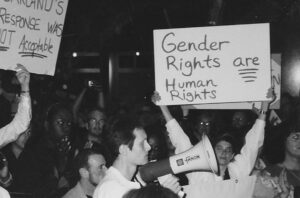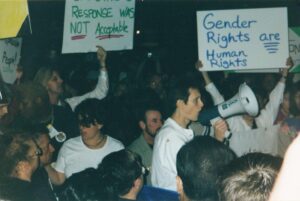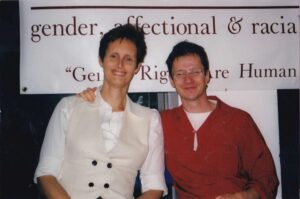Riki Wilchins was born on April 3rd, 1952, in Cincinnati, Ohio. She was a high-achieving student, performing the valediction at her high school, before earning a bachelor’s degree from Cleveland State University and a master’s degree in clinical psychology from the New School for Social Research.
In the late 1970s, Riki underwent gender reassignment. She moved to New York in 1981 and worked as a computer consultant on Wall Street. Riki’s journey as an advocate began here when she found solace in attending support groups at New York City’s Gay Community Center, including 12-step groups, as a means to address her own family trauma.
Riki’s impact on the transgender rights movement began to crystallize in the early 1990s. In 1992, she co-founded Camp Trans, an annual event challenging the exclusion of transgender women from the annual Michigan Womyn’s Music Festival. The action group was formed in response to the festival’s policy that excluded anyone not classified as “womyn-born womyn” and would run until the festival’s final event in 2015.
Riki was also instrumental in founding The Transexual Menace (later known as The Menace) in 1993, the first direct-action transgender rights organization. This group played a pivotal role in advocating for the inclusion of transgender people in lesbian, gay, and bisexual Pride marches.
Following this, Riki was asked to give a speech at the International Foundation for Gender Education. Here, she campaigned to add gender identity to the Employment Non-Discrimination Bill (ENDA) and to expand ENDA to include transgender.
In response, in 1995, Riki established GenderPAC, an association of existing transgender organizations aimed at addressing the lack of inclusion of transgender and gender-variant issues by larger LGBTQ+ organizations. GenderPAC gained rapid momentum and Riki helped dozens of corporations such as IBM and JP Morgan Chase to expand their employment non-discrimination policies to include gender identity and gender expression.
In 1996, she starred in Rosa von Praunheim ‘s groundbreaking documentary “The Transexual Menace”. The following year, led by Riki, GenderPAC produced The First National Study on Transviolence, focusing on violence against transgender and gender-variant people.
From the late 1990s, Riki and GenderPAC had a significant impact, organizing National Gender Lobby Days, and fostering dialogue with Congress members about discrimination and violence. GenderPAC also conducted groundbreaking research on violence against trans people, which played a role in the political push for hate crime protections for transgender individuals.
In 1997, Riki founded the National Coalition for Sexual Freedom and continued to champion a variety of causes. In 1999, GenderPAC was part of the Hate Crimes Coalition that successfully campaigned for the introduction of the Hate Crimes Prevention Act, which was eventually passed in 2009.
Riki’s tireless campaigning continued in 2001 when she organized the first National Conference on Gender. The same year, Riki’s dedication and influence were recognized when Time magazine named her as one of the “100 Civic Innovators for the 21st Century.”
Riki Wilchins’ lifelong dedication to transgender rights, from grassroots activism to legislative advocacy, has had a profound impact. Her relentless efforts have paved the way for greater visibility, understanding, acceptance, and inclusion of transgender individuals in society.








